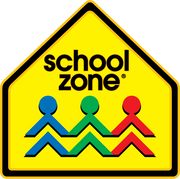At School Zone, we believe that learning should be both fun and impactful. Visual perception is a crucial part of how children grow and learn, influencing their ability to understand and interact with the world around them. These skills help children interpret what they see, which is vital for everything from reading to problem-solving. Visual perception games are a fantastic way to boost these skills while ensuring children enjoy the learning process.
This article will explore the importance of visual perceptual skills, fine motor skills, and gross (large) motor skills development. By understanding how these areas connect, we aim to show how visual perception games can support your child's educational journey.
Understanding visual perceptual skills
Visual perceptual skills enable children to process and make sense of the visual information they encounter. These skills are essential for recognizing shapes, patterns, and spatial relationships, which are foundational for tasks like reading and writing. In fact, Skill Point Therapy suggests, “The pivotal role of visual perception in children's academic success cannot be overstated, given its direct influence on crucial cognitive abilities necessary for learning.“
Games, including those available in digital tools and apps, play a significant role in enhancing these skills by providing interactive experiences that challenge and develop them.
The connection between visual perception and fine motor skills
Visual perception is closely linked to fine motor skills, which involve precise movements needed for tasks like writing or buttoning a shirt. Activities that enhance visual perception also help refine these skills.
Fine motor skills develop in stages as children grow. The Cleveland Clinic outlines in more detail these stages:
- Infancy: Development of grasping objects
- Toddlerhood: Refinement of skills such as stacking blocks and turning pages
- Preschool Age: Mastery of more complex tasks like drawing and cutting
To nurture both visual and fine motor skills, consider activities like:
- Building with blocks or Lego sets
- Coloring, drawing, cutting with scissors, and gluing
- Solving simple puzzles and playing matching games
Enhancing gross motor skills through visual perception
Gross motor skills involve the body's larger muscles and are key to physical development. Activities like running, jumping, and throwing are part of this skill set. Visual perception games can help by improving how children interpret visual information.
These games often require tracking moving objects or navigating spaces, which strengthens gross motor skills. For instance, playing catch or kickball enhances coordination and timing. Circle of Care, a multi-location provider of speech, physical, and occupational therapy for kids, suggests that “Gross motor skills are important for overall physical development, posture, coordination and balance.” They further note that developing kids’ gross motor skills, increases “their stamina and agility, enabling them to explore the world around them more freely.”
Incorporate visual perception games into playtime with activities like:
- Obstacle courses
- Games of catch or kickball
- Interactive video games that encourage movement
Interactive games and activities for skill development
Interactive games and activities are excellent for developing both visual perception and motor skills. They make learning enjoyable and help build essential skills through play.
- Digital Learning Apps: These apps offer interactive challenges that promote active learning and improve visual perceptual skills. Many develop hand-eye coordination and some fine motor skills, but others actually get kids moving around. Children’s Hospital of Philadelphia has compiled a list of get-moving apps.
- Online Platforms: Websites and platforms provide a variety of visual perception games that support skill development.
- School Zone's Digital Learning Apps: Our Anywhere Teacher subscription offers a wide range of educational games and activities perfect for developing and enhancing a wide range of skills including visual and motor skills. Some of the activities, Get Up and Move Action Words Flash Cards, which ask kids to imitate the movement of a variety of critters and objects, get kids thinking and moving creatively!
By integrating these tools into your child's routine, you can create a rich learning environment that supports their overall growth.
Practical tips for parents and educators
Incorporating visual perception games into daily life is simple and beneficial. Here are some tips:
- Daily Activities: Use everyday tasks like sorting laundry, setting the table, or playing catch to improve visual and motor skills.
- Planned Play: Set aside time for educational toys and games, such as puzzles, building blocks, and cut-and-paste to promote fine motor skills.
- School Zone Products: Utilize School Zone's resources like workbooks and flash cards to create a comprehensive learning environment. For example, our Cut & Paste Preschool Workbook has more than 80 clipping and pasting exercises that will help your child practice scissor skills and other important basics. Activities such as dot-to-dot puzzles can build hand-eye coordination along with alphabet and number skills. Hidden picture puzzles are great for developing visual discrimination.
These strategies can support your child's development while making learning enjoyable.
Encourage lifelong learning and development
Visual perception is vital for a child's growth. By engaging in activities that enhance this skill, children improve their ability to interpret visual information, crucial for academic success and everyday life. School Zone is dedicated to providing resources that make learning both fun and effective.
Explore our range of educational products designed to support lifelong learning and development. By incorporating these resources into your child's daily routine, you can help them build a strong foundation for future success.











